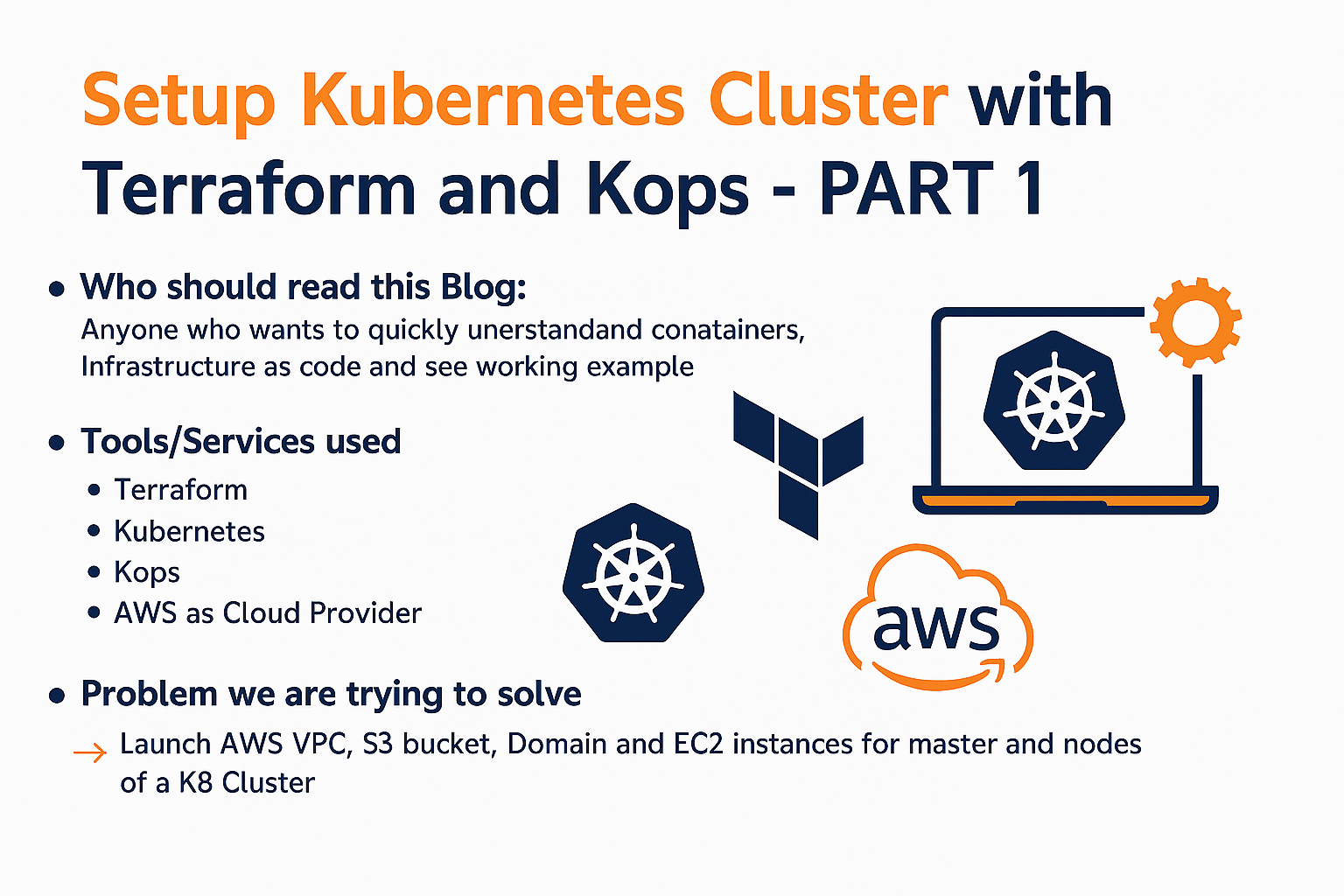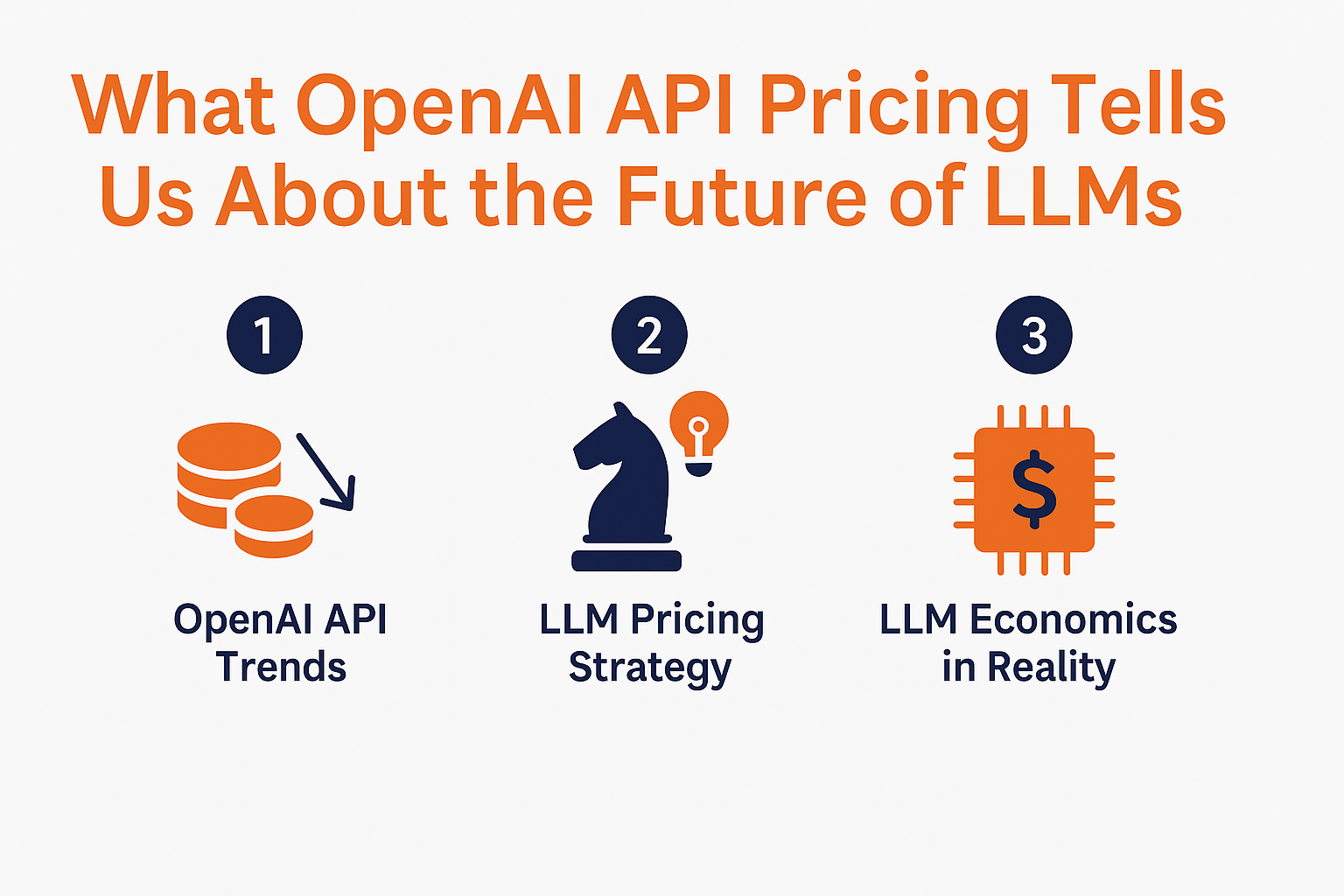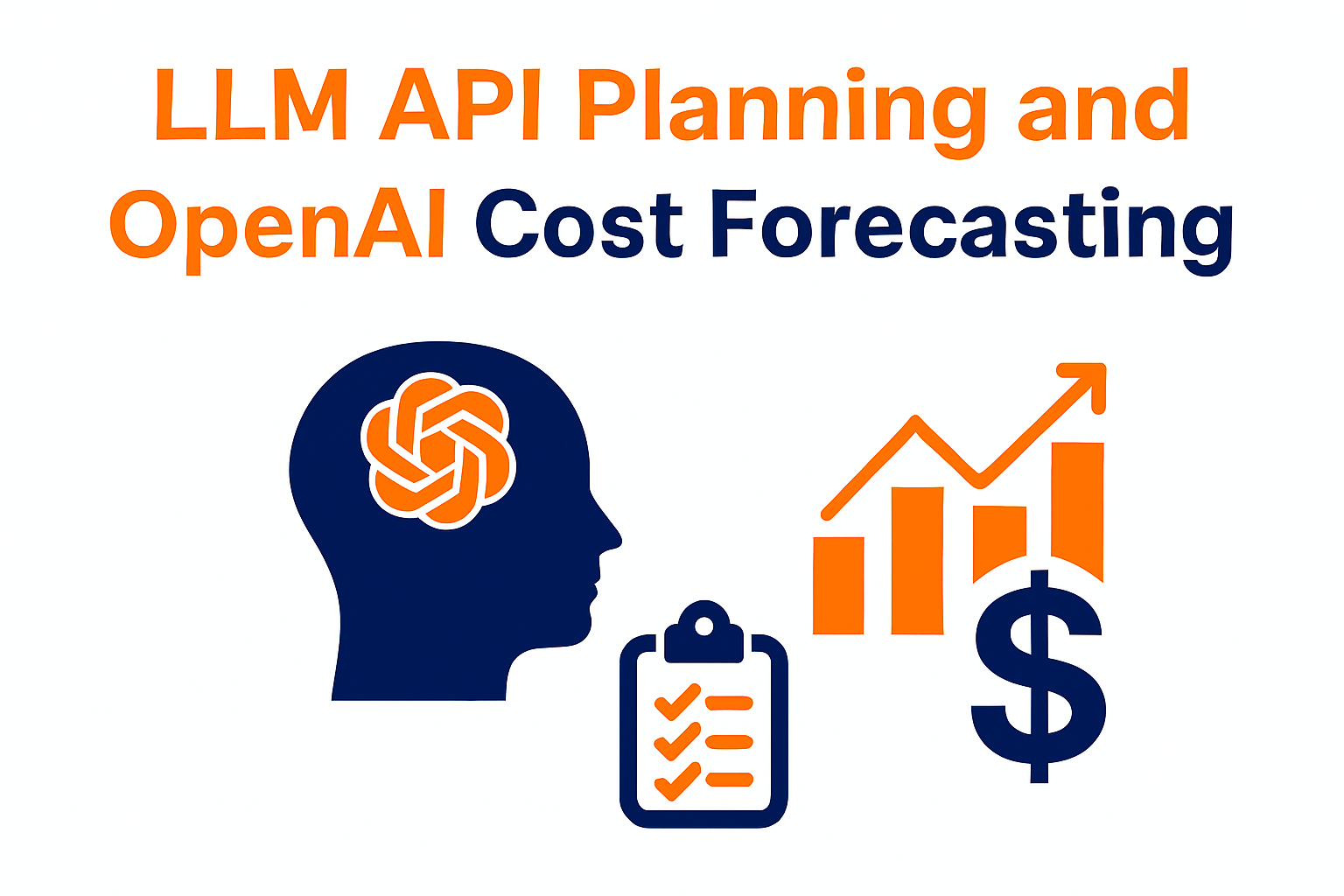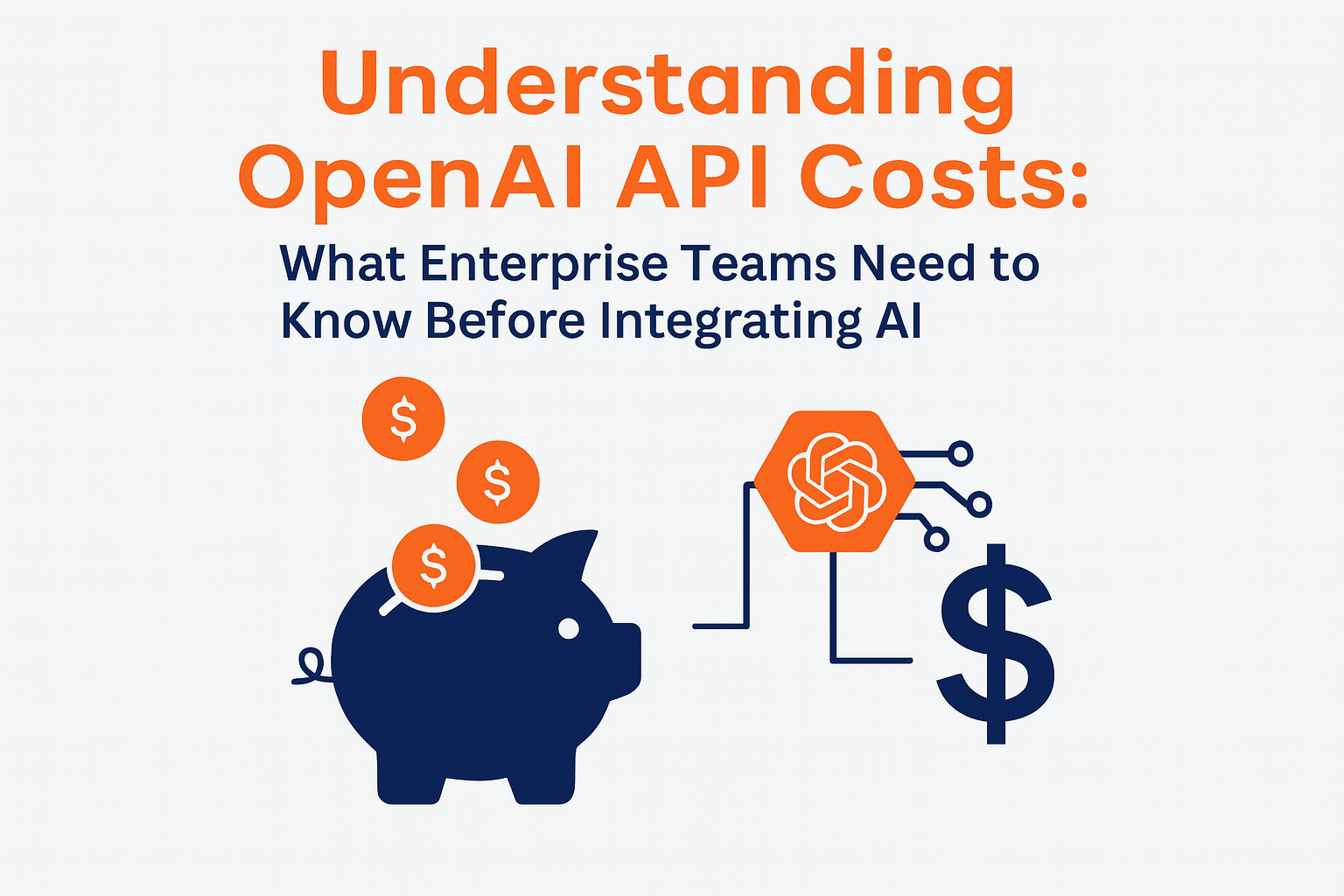April 9, 2019
Setup Kubernetes Cluster with Terraform and Kops – PART 1

- Who should read this Blog:
- Short introduction
- Problem we are trying to solve
- Stack used
- Actual implementation
Who should read this Blog:
This Blog is for those who wants to quickly get an overall general understanding on setting up a container eco system and understand how infrastructure as a code looks like. this is meant for all who wants to see an working example of the above mentioned concepts.
This is not an advanced level tutorial.
- I am using Terraform to maintain the underlying Infrastructure which will the host the set of containers/pods
- I am using Kubernetes (K8) as container Orchestrator
- Using Kops to manage the K8 Cluster lifecycle
- Using AWS as cloud provider

Short introduction
The aim of this blog is not to give in depth knowledge of Terraform or K8. but to show an working example as a quick start guide
What is Terraform
Terraform is a tool for building, changing, and versioning infrastructure safely and efficiently. Terraform can manage existing and popular service providers as well as custom in-house solutions.
Pls refer : https://www.terraform.io/intro/index.html for further info
What is Kubernetes
K8 is an open-source system for automating deployment, scaling, and management of containerized applications. It groups containers that make up an application into logical units for easy management and discovery.
Pls refer : https://kubernetes.io/ for further info
What is KOPS
kops helps you create, destroy, upgrade and maintain production-grade, highly available, Kubernetes clusters from the command line. AWS (Amazon Web Services) is currently officially supported
Pls refer: https://github.com/kubernetes/kops
What is Kubectl
Kubectl is a command line interface for running commands against Kubernetes clusters
Pls refer: https://kubernetes.io/docs/reference/kubectl/overview/
Problem we are trying to solve
We will launch an AWS VPC, S3 bucket and Domain using terraform which are AWS resources and use KOPS for launching the ec2 instances of master and nodes to set up a K8 Cluster
Stack used
Cloud: AWS
Region: us-west-2
Instance Type: t2.medium
OS: Ubuntu 18.04
AMI : ami-005bdb005fb00e791
Warning
Please check the details before using scripts to launch it will incur some cost in the AWS
Actual implementation
Install Terraform, Kops and Kubectl
clone the repo https://github.com/AVM-Consulting/declarative-infrastructure
git clone https://github.com/AVM-Consulting/declarative-infrastructure
cd declarative-infrastructure
chmod 755 setup_env.sh
./setup_env.sh
###############################################
#Output will be as follows
###############################################
Hit:1 http://us-west-2.ec2.archive.ubuntu.com/ubuntu bionic InRelease
Get:2 http://us-west-2.ec2.archive.ubuntu.com/ubuntu bionic-updates InRelease [88.7 kB]
Get:3 http://us-west-2.ec2.archive.ubuntu.com/ubuntu bionic-backports InRelease [74.6 kB]
Get:4 http://security.ubuntu.com/ubuntu bionic-security InRelease [88.7 kB]
Fetched 252 kB in 1s (298 kB/s)
Reading package lists... Done
Reading package lists... Done
Building dependency tree
Reading state information... Done
jq is already the newest version (1.5+dfsg-2).
0 upgraded, 0 newly installed, 0 to remove and 73 not upgraded.
Reading package lists... Done
Building dependency tree
Reading state information... Done
unzip is already the newest version (6.0-21ubuntu1).
0 upgraded, 0 newly installed, 0 to remove and 73 not upgraded.
======================================================================================
[2019-04-07 08:24:17]: INFO: Start Kops Download -> Version : 1.11.1 and Flavor: kops-linux-amd64
[2019-04-07 08:24:23]: INFO: Download Complete
[2019-04-07 08:24:23]: INFO: Kops setup done -> Version : 1.11.1 and Flavor: kops-linux-amd64
======================================================================================
[2019-04-07 08:24:23]: INFO: Start Kubectl Download
[2019-04-07 08:24:24]: INFO: Download Complete
[2019-04-07 08:24:24]: INFO: Kubectl setup done -> Version : v1.14.0
======================================================================================
[2019-04-07 08:24:26]: INFO: Download Terraform -> Version 0.11.13
[2019-04-07 08:24:27]: INFO: Download Complete
Archive: terraform_0.11.13_linux_amd64.zip
inflating: terraform
======================================================================================
[2019-04-07 08:24:29]: INFO: VERIFY KOPS
[2019-04-07 08:24:30]: INFO: VERIFY KUBECTL
[2019-04-07 08:24:30]: INFO: VERIFY TERRAFORM
Terraform v0.11.13
[2019-04-07 08:24:30]: INFO: Validation Successful !!!
======================================================================================
Setup S3, VPC and Security Group using Terraform
- clone the repo
git clone https://github.com/AVM-Consulting/declarative-infrastructure - cd declarative-infrastructure && cd terraform-files
terraform initto initialise the terraform workspaceterraform planthis is a dry run where actual execution doesn’t happen but terraform shows what it will doterraform graphoptional but you can check how the dependencies are- finally
terraform applyto execute - giving some sample output below you would also see how terraform outputs file is helping displaying the required output
- in this terraform files we have covered how to use
- data
- modules
- outputs
- local variables .. we will cover more in subsequent series
- Some references
#########################################################################
# Output of a terraform init
#########################################################################
ubuntu@ip-172-31-44-201:~/declarative-infrastructure/terraform-files$ terraform init
Initializing modules...
- module.blog_vpc
Found version 1.60.0 of terraform-aws-modules/vpc/aws on registry.terraform.io
Getting source "terraform-aws-modules/vpc/aws"
Initializing provider plugins...
- Checking for available provider plugins on https://releases.hashicorp.com...
- Downloading plugin for provider "aws" (2.6.0)...
The following providers do not have any version constraints in configuration,
so the latest version was installed.
To prevent automatic upgrades to new major versions that may contain breaking
changes, it is recommended to add version = "..." constraints to the
corresponding provider blocks in configuration, with the constraint strings
suggested below.
* provider.aws: version = "~> 2.6"
Terraform has been successfully initialized!
You may now begin working with Terraform. Try running "terraform plan" to see
any changes that are required for your infrastructure. All Terraform commands
should now work.
If you ever set or change modules or backend configuration for Terraform,
rerun this command to reinitialize your working directory. If you forget, other
commands will detect it and remind you to do so if necessary.
######################################################################
# output of a terraform apply
#######################################################################
ubuntu@ip-172-31-44-201:~/declarative-infrastructure/terraform-files$ terraform apply
...skipping part of output ...
module.blog_vpc.aws_route.private_nat_gateway[1]: Creation complete after 0s (ID: r-rtb-093a778094db492241080289494)
module.blog_vpc.aws_route.private_nat_gateway[2]: Creation complete after 0s (ID: r-rtb-020cf78f454e1aba71080289494)
module.blog_vpc.aws_route.private_nat_gateway[0]: Creation complete after 0s (ID: r-rtb-0e006178f8bfa887a1080289494)
Apply complete! Resources: 9 added, 0 changed, 0 destroyed.
Outputs:
availability_zones = [
us-west-2a,
us-west-2b,
us-west-2c
]
common_http_sg_id = sg-04bb26488f455e9a5
default_security_group_id = sg-020a829bcdc36d239
kops_s3_bucket = k8.cloudservices2go.com
kubernetes_cluster_name = blog.cloudservices2go.com
nat_gateway_ids = [
nat-04884a9df64dc2099,
nat-0ccbf831effb9ad2c,
nat-05ffe724a00e92a26
]
private_route_table_ids = [
rtb-0e006178f8bfa887a,
rtb-093a778094db49224,
rtb-020cf78f454e1aba7
]
private_subnet_ids = [
subnet-03788eca5f2aa0f69,
subnet-08f88757683c4e6d5,
subnet-0d0508d513a0db975
]
public_route_table_ids = [
rtb-0135b9019663b2909
]
public_subnet_ids = [
subnet-0d605eda93449e46a,
subnet-018aeef0867af06fb,
subnet-0fcb2eb7dd8289fc5
]
region = us-west-2
vpc_cidr_block = 14.0.0.0/16
vpc_id = vpc-06a1a64382adb8ed4
vpc_name = blog-vpc-cloudservices2go.com
Setup K8 Cluster using KOPS and Terraform
- we will make use of
kops templatingtool which is based onGOtemplates - we will make sure we have ~/.ssh/id-rsa.pub ready else generate one using
ssh-keygen - run
kops create secret --name blog.cloudservices2go.com --state s3://k8.cloudservices2go.com sshpublickey admin -i ~/.ssh/id_rsa.pub- the above steps is due to kops issue Refer: https://github.com/kubernetes/kops/issues/3693
- we now run a small utility script
./generate-tf-files.shfrom the repo to generate the terraform files lets - run
terraform init - run
terraform plan - run
terraform apply - BOOM ! our Kops cluster is ready
ubuntu@ip-172-31-44-201:~/declarative-infrastructure/k8$ kops create secret --name blog.cloudservices2go.com --state s3://k8.cloudservices2go.com sshpublickey admin -i ~/.ssh/id_rsa.pub
############################################################
# output of ./generate-tf-files.sh
############################################################
ubuntu@ip-172-31-44-201:~/declarative-infrastructure/k8$ ./generate-tf-files.sh
*********************************************************************************
A new kubernetes version is available: 1.10.13
Upgrading is recommended (try kops upgrade cluster)
More information: https://github.com/kubernetes/kops/blob/master/permalinks/upgrade_k8s.md#1.10.13
*********************************************************************************
*********************************************************************************
Kubelet anonymousAuth is currently turned on. This allows RBAC escalation and remote code execution possibilites.
It is highly recommended you turn it off by setting 'spec.kubelet.anonymousAuth' to 'false' via 'kops edit cluster'
See https://github.com/kubernetes/kops/blob/master/docs/security.md#kubelet-api
*********************************************************************************
W0412 11:21:08.616407 4709 external_access.go:39] KubernetesAPIAccess is empty
W0412 11:21:08.616444 4709 external_access.go:43] SSHAccess is empty
I0412 11:21:09.017197 4709 executor.go:103] Tasks: 0 done / 92 total; 40 can run
I0412 11:21:09.019234 4709 dnszone.go:242] Check for existing route53 zone to re-use with name ""
I0412 11:21:09.147644 4709 dnszone.go:249] Existing zone "cloudservices2go.com." found; will configure TF to reuse
I0412 11:21:09.370175 4709 vfs_castore.go:736] Issuing new certificate: "apiserver-aggregator-ca"
I0412 11:21:09.595899 4709 vfs_castore.go:736] Issuing new certificate: "ca"
I0412 11:21:09.807509 4709 executor.go:103] Tasks: 40 done / 92 total; 28 can run
I0412 11:21:10.623507 4709 vfs_castore.go:736] Issuing new certificate: "kube-controller-manager"
I0412 11:21:10.822131 4709 vfs_castore.go:736] Issuing new certificate: "kubecfg"
I0412 11:21:10.862803 4709 vfs_castore.go:736] Issuing new certificate: "kubelet"
I0412 11:21:10.903090 4709 vfs_castore.go:736] Issuing new certificate: "kube-scheduler"
I0412 11:21:11.101020 4709 vfs_castore.go:736] Issuing new certificate: "kubelet-api"
I0412 11:21:11.315278 4709 vfs_castore.go:736] Issuing new certificate: "master"
I0412 11:21:11.491097 4709 vfs_castore.go:736] Issuing new certificate: "apiserver-aggregator"
I0412 11:21:11.662531 4709 vfs_castore.go:736] Issuing new certificate: "kops"
I0412 11:21:11.704351 4709 vfs_castore.go:736] Issuing new certificate: "kube-proxy"
I0412 11:21:11.842441 4709 vfs_castore.go:736] Issuing new certificate: "apiserver-proxy-client"
I0412 11:21:12.070497 4709 executor.go:103] Tasks: 68 done / 92 total; 16 can run
I0412 11:21:12.195891 4709 executor.go:103] Tasks: 84 done / 92 total; 5 can run
I0412 11:21:12.196354 4709 executor.go:103] Tasks: 89 done / 92 total; 3 can run
I0412 11:21:12.196544 4709 executor.go:103] Tasks: 92 done / 92 total; 0 can run
I0412 11:21:12.203555 4709 target.go:312] Terraform output is in .
I0412 11:21:12.589124 4709 update_cluster.go:290] Exporting kubecfg for cluster
kops has set your kubectl context to blog.cloudservices2go.com
Terraform output has been placed into .
Run these commands to apply the configuration:
cd .
terraform plan
terraform apply
Suggestions:
* validate cluster: kops validate cluster
* list nodes: kubectl get nodes --show-labels
* ssh to the master: ssh -i ~/.ssh/id_rsa admin@api.blog.cloudservices2go.com
* the admin user is specific to Debian. If not using Debian please use the appropriate user based on your OS.
* read about installing addons at: https://github.com/kubernetes/kops/blob/master/docs/addons.md.
############################################################
# output of terraform init
############################################################
ubuntu@ip-172-31-44-201:~/declarative-infrastructure/k8$ terraform init
Initializing provider plugins...
- Checking for available provider plugins on https://releases.hashicorp.com...
- Downloading plugin for provider "aws" (2.6.0)...
The following providers do not have any version constraints in configuration,
so the latest version was installed.
To prevent automatic upgrades to new major versions that may contain breaking
changes, it is recommended to add version = "..." constraints to the
corresponding provider blocks in configuration, with the constraint strings
suggested below.
* provider.aws: version = "~> 2.6"
Terraform has been successfully initialized!
You may now begin working with Terraform. Try running "terraform plan" to see
any changes that are required for your infrastructure. All Terraform commands
should now work.
If you ever set or change modules or backend configuration for Terraform,
rerun this command to reinitialize your working directory. If you forget, other
commands will detect it and remind you to do so if necessary.
############################################################
# Curtailed output of terraform apply
############################################################ubuntu@ip-172-31-44-201:~/declarative-infrastructure/k8$ terraform apply...skipping part of output ...
Apply complete! Resources: 40 added, 0 changed, 0 destroyed.
Outputs:
cluster_name = blog.cloudservices2go.com
master_autoscaling_group_ids = [
master-us-west-2a.masters.blog.cloudservices2go.com,
master-us-west-2b.masters.blog.cloudservices2go.com,
master-us-west-2c.masters.blog.cloudservices2go.com
]
master_security_group_ids = [
sg-0231e7ca2592da25b
]
masters_role_arn = arn:aws:iam::303882392497:role/masters.blog.cloudservices2go.com
masters_role_name = masters.blog.cloudservices2go.com
node_autoscaling_group_ids = [
nodes.blog.cloudservices2go.com
]
node_security_group_ids = [
sg-0e0aaf96e98bd2d64
]
node_subnet_ids = [
subnet-03788eca5f2aa0f69,
subnet-08f88757683c4e6d5,
subnet-0d0508d513a0db975
]
nodes_role_arn = arn:aws:iam::303882392497:role/nodes.blog.cloudservices2go.com
nodes_role_name = nodes.blog.cloudservices2go.com
region = us-west-2
subnet_ids = [
subnet-018aeef0867af06fb,
subnet-03788eca5f2aa0f69,
subnet-08f88757683c4e6d5,
subnet-0d0508d513a0db975,
subnet-0d605eda93449e46a,
subnet-0fcb2eb7dd8289fc5
]
subnet_us-west-2a_id = subnet-03788eca5f2aa0f69
subnet_us-west-2b_id = subnet-08f88757683c4e6d5
subnet_us-west-2c_id = subnet-0d0508d513a0db975
subnet_utility-us-west-2a_id = subnet-0d605eda93449e46a
subnet_utility-us-west-2b_id = subnet-018aeef0867af06fb
subnet_utility-us-west-2c_id = subnet-0fcb2eb7dd8289fc5
vpc_id = vpc-06a1a64382adb8ed4
Validate the K8 Setup
- kops validate cluster would show us the cluster state we created
- NoteMake sure you created proper Security group settings in your TF to make this command work
############################################################
# output of Validate Cluster
############################################################
ubuntu@ip-172-31-44-201:~/declarative-infrastructure/k8$ kops validate cluster --state s3://k8.cloudservices2go.com
Using cluster from kubectl context: blog.cloudservices2go.com
Validating cluster blog.cloudservices2go.com
INSTANCE GROUPS
NAME ROLE MACHINETYPE MIN MAX SUBNETS
master-us-west-2a Master t2.medium 1 1 us-west-2a
master-us-west-2b Master t2.medium 1 1 us-west-2b
master-us-west-2c Master t2.medium 1 1 us-west-2c
nodes Node t2.small 1 2 us-west-2a,us-west-2b,us-west-2c
NODE STATUS
NAME ROLE READY
ip-14-0-1-106.us-west-2.compute.internal master True
ip-14-0-1-184.us-west-2.compute.internal node True
ip-14-0-2-97.us-west-2.compute.internal master True
ip-14-0-3-4.us-west-2.compute.internal master True
Your cluster blog.cloudservices2go.com is ready
Install a Sample Application in the K8 Cluster
This is just an example app we will explain in detail in comming series how to deploy a full fledge application in K8. here we are just validating the setup as intention was to create a K* cluster using terraform steps are:
export CLUSTER_NAME=blog.cloudservices2go.comexport STATE=s3://k8.cloudservices2go.comkops export kubecfg --name ${CLUSTER_NAME} --state ${STATE}kubectl config set-cluster ${CLUSTER_NAME} --server=https://api.${CLUSTER_NAME}kubectl run -i --tty busybox --image=busybox -- sh
############################################################
# output of Application
############################################################
ubuntu@ip-172-31-44-201:~/declarative-infrastructure/k8$ export CLUSTER_NAME=blog.cloudservices2go.com
ubuntu@ip-172-31-44-201:~/declarative-infrastructure/k8$ export STATE=s3://k8.cloudservices2go.com
ubuntu@ip-172-31-44-201:~/declarative-infrastructure/k8$ kops export kubecfg --name ${CLUSTER_NAME} --state ${STATE}
kops has set your kubectl context to blog.cloudservices2go.com
ubuntu@ip-172-31-44-201:~/declarative-infrastructure/k8$ kubectl config set-cluster ${CLUSTER_NAME} --server=https://api.${CLUSTER_NAME}
Cluster "blog.cloudservices2go.com" set.
ubuntu@ip-172-31-44-201:~/declarative-infrastructure/k8$ kubectl get pods --all-namespaces
NAMESPACE NAME READY STATUS RESTARTS AGE
kube-system canal-kxrwc 3/3 Running 0 9m
kube-system canal-l842v 3/3 Running 0 11m
kube-system canal-sws2n 3/3 Running 0 9m
kube-system canal-vbqkg 3/3 Running 0 11m
kube-system dns-controller-64c55c5f49-qhjfz 1/1 Running 0 11m
kube-system etcd-server-events-ip-14-0-1-106.us-west-2.compute.internal 1/1 Running 0 11m
kube-system etcd-server-events-ip-14-0-2-97.us-west-2.compute.internal 1/1 Running 0 9m
kube-system etcd-server-events-ip-14-0-3-4.us-west-2.compute.internal 1/1 Running 0 10m
kube-system etcd-server-ip-14-0-1-106.us-west-2.compute.internal 1/1 Running 2 10m
kube-system etcd-server-ip-14-0-2-97.us-west-2.compute.internal 1/1 Running 4 9m
kube-system etcd-server-ip-14-0-3-4.us-west-2.compute.internal 1/1 Running 4 10m
kube-system kube-apiserver-ip-14-0-1-106.us-west-2.compute.internal 1/1 Running 3 10m
kube-system kube-apiserver-ip-14-0-2-97.us-west-2.compute.internal 1/1 Running 4 8m
kube-system kube-apiserver-ip-14-0-3-4.us-west-2.compute.internal 1/1 Running 4 10m
kube-system kube-controller-manager-ip-14-0-1-106.us-west-2.compute.internal 1/1 Running 0 10m
kube-system kube-controller-manager-ip-14-0-2-97.us-west-2.compute.internal 1/1 Running 0 9m
kube-system kube-controller-manager-ip-14-0-3-4.us-west-2.compute.internal 1/1 Running 0 11m
kube-system kube-dns-5fbcb4d67b-9tthl 3/3 Running 0 9m
kube-system kube-dns-5fbcb4d67b-k659l 3/3 Running 0 11m
kube-system kube-dns-autoscaler-6874c546dd-cc8mr 1/1 Running 0 11m
kube-system kube-proxy-ip-14-0-1-106.us-west-2.compute.internal 1/1 Running 0 10m
kube-system kube-proxy-ip-14-0-1-184.us-west-2.compute.internal 1/1 Running 0 9m
kube-system kube-proxy-ip-14-0-2-97.us-west-2.compute.internal 1/1 Running 0 9m
kube-system kube-proxy-ip-14-0-3-4.us-west-2.compute.internal 1/1 Running 0 10m
kube-system kube-scheduler-ip-14-0-1-106.us-west-2.compute.internal 1/1 Running 0 10m
kube-system kube-scheduler-ip-14-0-2-97.us-west-2.compute.internal 1/1 Running 0 9m
kube-system kube-scheduler-ip-14-0-3-4.us-west-2.compute.internal 1/1 Running 0 10m
ubuntu@ip-172-31-44-201:~/terraform/k8$ kubectl run -i --tty busybox --image=busybox -- sh
kubectl run --generator=deployment/apps.v1 is DEPRECATED and will be removed in a future version. Use kubectl run --generator=run-pod/v1 or kubectl create instead.
If you dont see a command prompt, try pressing enter.
/ #
/ # hostname
busybox-5858cc4697-6ml5s
/ # Session ended, resume using 'kubectl attach busybox-5858cc4697-6ml5s -c busybox -i -t' command when the pod is running
ubuntu@ip-172-31-44-201:~/declarative-infrastructure/k8$
ubuntu@ip-172-31-44-201:~/declarative-infrastructure/k8$ kubectl get pods --all-namespaces | grep busybox
default busybox-5858cc4697-6ml5s
Cleanup the setup
terraform destroy in respective dirtectories will cleanup everything you have setup
########################################################################################################################
# Curtailed output of dsetroy inside k8 directory This will cleanup KOPS resources
########################################################################################################################ubuntu@ip-172-31-44-201:~/declarative-infrastructure/k8$ terraform destroy...skipping part of output...
aws_security_group.masters-blog-cloudservices2go-com: Destroying... (ID: sg-0231e7ca2592da25b)
aws_key_pair.kubernetes-blog-cloudservices2go-com-028c527b33f74ce529a8c3bf07ae8da1: Destroying... (ID: kubernetes.blog.cloudservices2go.com-02...7b:33:f7:4c:e5:29:a8:c3:bf:07:ae:8d:a1)
aws_iam_instance_profile.masters-blog-cloudservices2go-com: Destroying... (ID: masters.blog.cloudservices2go.com)
aws_key_pair.kubernetes-blog-cloudservices2go-com-028c527b33f74ce529a8c3bf07ae8da1: Destruction complete after 0s
aws_security_group.masters-blog-cloudservices2go-com: Destruction complete after 1s
aws_iam_instance_profile.masters-blog-cloudservices2go-com: Destruction complete after 1s
aws_iam_role.masters-blog-cloudservices2go-com: Destroying... (ID: masters.blog.cloudservices2go.com)
aws_iam_role.masters-blog-cloudservices2go-com: Destruction complete after 0s
Destroy complete! Resources: 40 destroyed.
########################################################################################################################
# Curtailed output of dsetroy inside terraform-files directory This will cleanup Networks, SG and S3
########################################################################################################################ubuntu@ip-172-31-44-201:~/declarative-infrastructure/terraform-files$ terraform destroy...skipping part of output...
module.blog_vpc.aws_eip.nat[0]: Destroying... (ID: eipalloc-0edf9c365bc69e954)
module.blog_vpc.aws_eip.nat[1]: Destruction complete after 0s
module.blog_vpc.aws_eip.nat[2]: Destruction complete after 0s
module.blog_vpc.aws_eip.nat[0]: Destruction complete after 0s
module.blog_vpc.aws_subnet.public[1]: Destruction complete after 1s
module.blog_vpc.aws_subnet.public[2]: Destruction complete after 1s
module.blog_vpc.aws_subnet.public[0]: Destruction complete after 1s
module.blog_vpc.aws_internet_gateway.this: Still destroying... (ID: igw-069ddee7c85a4a274, 10s elapsed)
module.blog_vpc.aws_internet_gateway.this: Destruction complete after 10s
module.blog_vpc.aws_vpc.this: Destroying... (ID: vpc-06a1a64382adb8ed4)
module.blog_vpc.aws_vpc.this: Destruction complete after 1s
Destroy complete! Resources: 30 destroyed.
By the way, check out our best AWS deal: http://avmconsulting.net/well-architected-review

More News







